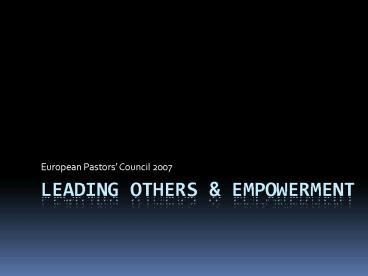Leading Others PowerPoint PPT Presentation
1 / 20
Title: Leading Others
1
Leading Others Empowerment
- European Pastors Council 2007
2
What do they have in common?
- The elder of a small church in Copenhagen,
Denmark - The pastor of the SDA church in Sheffield,
England - The pastor of the Central Church in Nishny
Novgorod, Russia - The elder of the Miraflores SDA church in Lima,
Peru.
3
Need more better leaders
G
E
(3) Quality of Leader-ship Lifted
C
(1) More Members
B
D
F
A
(2) More Leaders
4
Leadership is a platform for service
5
Five types of leaders
6
Five types of leaders
7
A leader is . . .
- A person who has an unusual degree of power to
create the conditions under which other people
must live and move and have their
beingconditions that can either be as
illuminating as heaven or as shadowy as hell. A
leader is a person who must take special
responsibility for whats going on inside him- or
herself, inside his or her consciousness, lest
the act of leadership create more harm than
good. - Parker Palmer, Leading From Within,1990, p. 7.
8
A Christian leader . . .
- . . . A person with God-given capacity and
God-given responsibility to influence a specific
group of Gods people toward the fulfillment of
Gods purposes for that group. (J. Robert Clinton)
9
Spiritual leadership emergence
The Idealized Timeline of a Leader
I II III IV V VI
I Sovereign Foundations
II Inner Life Growth
III Ministry Maturing
IV Life Maturing
V Convergence
VI After Glow
Source Clinton The Making of a Leader 1988
10
God develops leaders
- Over a lifetime (potter clay).
- Inner life growth first (spiritual formation).
- Growth in ministry (ministry formation).
- Moving leaders towards convergence (strategic
formation).
11
Leadership development myths
- Leaders are born
- Moses, Samuel, David
- Leaders simply emerge as a result of social
pressure or need - Joseph, Moses, Gideon, Saul, Nehemiah
- We can train people to be effective leaders in
school - Seminars, workshops, leadership training
programs,
12
Fred Fiedler
- Leadership Training Does Not Produce Leaders.
- Source Fred Fiedler, The Trouble With
Leadership Training Is That It Doesnt Train
Leaders, in W. R. Lassey and R. R. Fernandez,
Leadership and Social Change (La Jolla, CA
University Associates, 1976) 238-246.
13
Learning thru experience
- Learning is a process whereby knowledge is
created through the transformation of experience.
1 Experiencing
4 Experimenting with new skills
2 Reflecting
3 Learning New Principles
14
The power of reflection
- Reflection and the support of a learning
community is the most empowering means whereby
adult learners develop their own capacity to
lead.
15
Leadership empowerment
- The process of leadership development is
essentially the process of empowerment.
(Elliston, 126) - Leadership is best learned on the job where
developmental factors are present. (Callahan)
16
Power in em-power-ment
- The more that is given, the more that remains.
On the other hand, the more spiritual power is
grasped, the less it becomes. (Elliston, 124)
17
Leadership development
- Leadership Selection Principle
- If God called you to lead, he also called you to
develop emerging leaders. (2 Timothy 22) - Leadership Prayer Principle
- If God has called you to lead, he has called you
to pray for those you lead. (1 Samuel 1223) - Leadership Development Principle
- God develops leaders over a lifetime.
- (Heb. 137-8)
18
Leadership training
Steps Theory Model Practice Coach
Know Do Teach
- 80 5-15 5
80 5-15 5
80 80 5-15
80 80 80
19
Developing leadership teams
- A learning group consists of 4 - 7 persons.
- Long-term focus on a learning agenda related to
mission of the church in the community. - Specific meeting times to focus on agenda.
- Assignments accountability.
- Modeling, demonstrations, practice, feedback and
coaching, with emphasis on results in ministry. - Risk free environment , collaboration, and peer
coaching.
20
Change in role of the pastor
Stage 1
Stage 2
Stage 3
Stage 4
- 1000
- 800
- 600
- 500
- 400
- 300
- 200
- 100
- 0
Shepherd to All
Shepherd to All
Shepherd to All
Shepherd to All
Through Profs, Lay Leaders Workers)
Through Leaders ( Workers)
Through Workers
Personal
Leadership Skills
Model
Delegate it!
Transfer it! (Partial)
Transfer it! (Totally)

